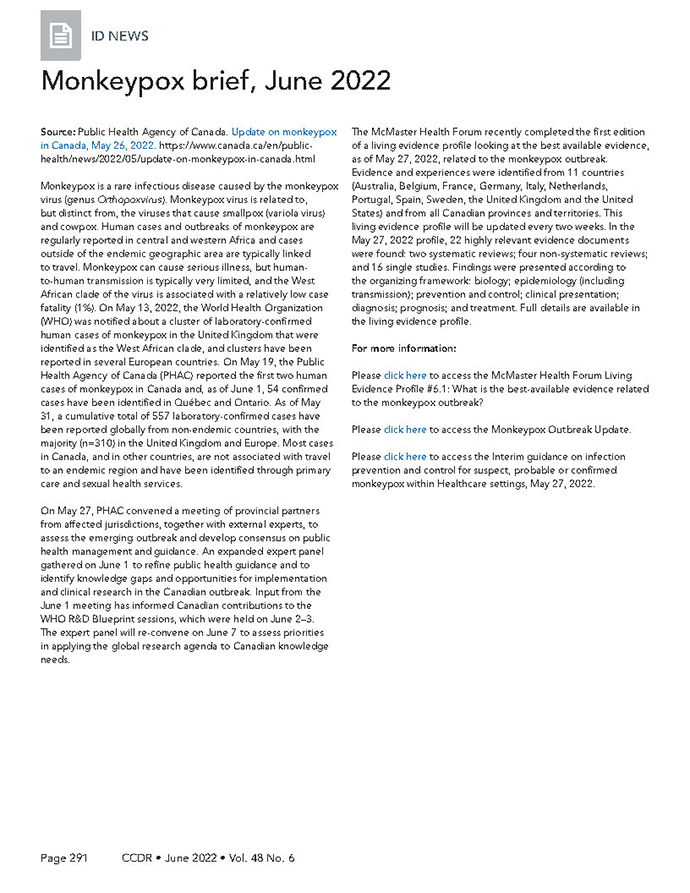Monkeypox in Canada, 2022
This publication was published before November 28, 2022. Since then, the World Health Organization began using ‘mpox’ as the preferred term for monkeypox disease.

 Download this article as a PDF
Download this article as a PDFPublished by: The Public Health Agency of Canada
Issue: Volume 48-6, June 2022: Vector-Borne Infections–Part 2: Wildlife & Companion Animals
Date published: June 2022
ISSN: 1481-8531
Submit a manuscript
About CCDR
Browse
Volume 48-6, June 2022: Vector-Borne Infections–Part 2: Wildlife & Companion Animals
ID News
Monkeypox brief, June 2022
Source: Public Health Agency of Canada. Update on monkeypox in Canada, May 26, 2022. https://www.canada.ca/en/public-health/news/2022/05/update-on-monkeypox-in-canada.html
Monkeypox is a rare infectious disease caused by the monkeypox virus (genus Orthopoxvirus). Monkeypox virus is related to, but distinct from, the viruses that cause smallpox (variola virus) and cowpox. Human cases and outbreaks of monkeypox are regularly reported in central and western Africa and cases outside of the endemic geographic area are typically linked to travel. Monkeypox can cause serious illness, but human-to-human transmission is typically very limited, and the West African clade of the virus is associated with a relatively low case fatality (1%). On May 13, 2022, the World Health Organization (WHO) was notified about a cluster of laboratory-confirmed human cases of monkeypox in the United Kingdom that were identified as the West African clade, and clusters have been reported in several European countries. On May 19, the Public Health Agency of Canada (PHAC) reported the first two human cases of monkeypox in Canada and, as of June 1, 54 confirmed cases have been identified in Québec and Ontario. As of May 31, a cumulative total of 557 laboratory-confirmed cases have been reported globally from non-endemic countries, with the majority (n=310) in the United Kingdom and Europe. Most cases in Canada, and in other countries, are not associated with travel to an endemic region and have been identified through primary care and sexual health services.
On May 27, PHAC convened a meeting of provincial partners from affected jurisdictions, together with external experts, to assess the emerging outbreak and develop consensus on public health management and guidance. An expanded expert panel gathered on June 1 to refine public health guidance and to identify knowledge gaps and opportunities for implementation and clinical research in the Canadian outbreak. Input from the June 1 meeting has informed Canadian contributions to the WHO R&D Blueprint sessions, which were held on June 2–3. The expert panel will re-convene on June 7 to assess priorities in applying the global research agenda to Canadian knowledge needs.
The McMaster Health Forum recently completed the first edition of a living evidence profile looking at the best available evidence, as of May 27, 2022, related to the monkeypox outbreak. Evidence and experiences were identified from 11 countries (Australia, Belgium, France, Germany, Italy, Netherlands, Portugal, Spain, Sweden, the United Kingdom and the United States) and from all Canadian provinces and territories. This living evidence profile will be updated every two weeks. In the May 27, 2022 profile, 22 highly relevant evidence documents were found: two systematic reviews; four non-systematic reviews; and 16 single studies. Findings were presented according to the organizing framework: biology; epidemiology (including transmission); prevention and control; clinical presentation; diagnosis; prognosis; and treatment. Full details are available in the living evidence profile.
For more information:
Please click here to access the McMaster Health Forum Living Evidence Profile #6.1: What is the best-available evidence related to the monkeypox outbreak?
Please click here to access the Monkeypox Outbreak Update.
Please click here to access the Interim guidance on infection prevention and control for suspect, probable or confirmed monkeypox within Healthcare settings, May 27, 2022.
